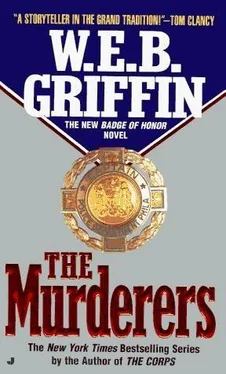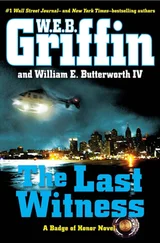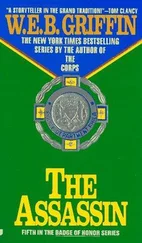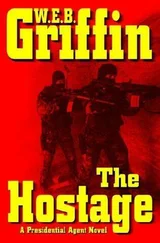W.E.B Griffin - The Murderers
Здесь есть возможность читать онлайн «W.E.B Griffin - The Murderers» весь текст электронной книги совершенно бесплатно (целиком полную версию без сокращений). В некоторых случаях можно слушать аудио, скачать через торрент в формате fb2 и присутствует краткое содержание. Жанр: Криминальный детектив, на английском языке. Описание произведения, (предисловие) а так же отзывы посетителей доступны на портале библиотеки ЛибКат.
- Название:The Murderers
- Автор:
- Жанр:
- Год:неизвестен
- ISBN:нет данных
- Рейтинг книги:3 / 5. Голосов: 1
-
Избранное:Добавить в избранное
- Отзывы:
-
Ваша оценка:
- 60
- 1
- 2
- 3
- 4
- 5
The Murderers: краткое содержание, описание и аннотация
Предлагаем к чтению аннотацию, описание, краткое содержание или предисловие (зависит от того, что написал сам автор книги «The Murderers»). Если вы не нашли необходимую информацию о книге — напишите в комментариях, мы постараемся отыскать её.
The Murderers — читать онлайн бесплатно полную книгу (весь текст) целиком
Ниже представлен текст книги, разбитый по страницам. Система сохранения места последней прочитанной страницы, позволяет с удобством читать онлайн бесплатно книгу «The Murderers», без необходимости каждый раз заново искать на чём Вы остановились. Поставьте закладку, и сможете в любой момент перейти на страницу, на которой закончили чтение.
Интервал:
Закладка:
And that came to pass. Police Officer Matthew M. Payne took the Examination for Promotion to Detective, passed it, and with a high enough score (he placed third) so as to earn promotion very soon after the results were published.
He was duly transferred to the East Detective Division, which is on the second floor of the building housing the Twenty-fourth and Twenty-fifth Districts at Front and Westmoreland streets, and there began his career as a detective under the tutelage of Sergeant Aloysius J. Sutton.
His initial war of detection against crime wherever found had consisted almost entirely of investigating recovered stolen vehicles. This, in turn, consisted of going to where the stolen vehicle had been located, and then filling out a half-dozen forms in quadruplicate. None of these forms, he had quickly come to understand, would-once they had passed Sergeant Sutton’s examination of them for bureaucratic perfection-ever be seen by human eyes again.
Almost all stolen and then recovered vehicles had been taken either by kids who wished to take a joyride and had no vehicle of their own in which to do so or by kids who wished to remove the tires, wheels, radios from said vehicles with the notion of selling them for a little pocket money. Or a combination of the foregoing.
Stolen and never-recovered vehicles were almost always stolen by professional thieves who either stripped the car to its frame or got it on the boat to Asuncion, Paraguay, before the owner realized it was gone.
Theft of an automobile is a felony, however, and investigation of felonies, including the return of recovered stolen property, is a police responsibility. Detective Payne learned in EDD that this responsibility, when the recovered property was an automobile, is normally placed in the hands of the member of the detective squad whose time is least valuable.
There was a sort of sense to this, and he told himself that investigating recovered vehicles was both sort of on-the-job training for more important investigations, and a rite-of-passage. Every new detective went through it.
And he was prepared to do whatever was asked of him.
But then his assignment to EDD came to an abrupt end. He was reassigned to Special Operations. In theory it was a simple personnel matter, the reassignment of a detective from a unit where his services weren’t really required to a unit which had need of his services. Matt quickly learned that he had been reassigned to Special Operations because the Mayor had suggested to Commissioner Czernich that this might be a wise thing to do.
There he found that the table of organization now provided for an investigation section. The supervisor of the investigation section was newly promoted Sergeant Jason Washington. Under him were personnel spaces for five detectives, three of whom had been assigned: Tony Harris, Jesus Martinez, and Matthew M. Payne.
Tony Harris was an experienced homicide detective recruited (Harris and Washington both used the term “shanghaied”) from Homicide when they were trying to catch up with Warren K. Fletcher, and kept over their objections because Peter Wohl felt his extraordinary investigative skills would almost certainly be needed in the future.
Jesus Martinez was another young police officer, although far more experienced than Matt. He had begun his police career working undercover in the Narcotics Unit, under then Lieutenant David Pekach. He and another young plainclothes officer named Charles McFadden had-“displaying professional skill and extraordinary initiative far beyond that expected of officers of their rank and experience” according to their departmental citations-located and run to earth “with complete disregard of their personal safety” one Gerald Vincent Gallagher, who had shot to death Captain Richard C. “Dutch” Moffitt during an armed robbery.
The resultant publicity had destroyed their ability to function as undercover Narcotics officers, and for that reason, and as a reward for their effective closing of the case of Captain Moffitt’s murder (Mr. Gallagher had been cut into several pieces when run over by a subway train as Officers McFadden and Martinez chased him down the subway tracks), they had been transferred to Highway Patrol.
Highway Patrol was considered a very desirable assignment, and officers were normally not considered for Highway Patrol duty until they had from five to seven years of exemplary service. Inasmuch as Captain Moffitt had been Commanding Officer of Highway at the time of his murder, it was generally agreed that the assignment of Officers McFadden and Martinez to Highway was entirely appropriate, their semi-rookie status notwithstanding.
Officer Martinez had ranked seventh on the Examination for Promotion to Detective when he and several hundred other ambitious police officers had taken it, and had been on the same promotion list which elevated Officer Payne to detective. Officer McFadden had not done nearly as well on the examination, and had been pleasantly surprised to find his the last name on the promotion list when it came out.
Detective Payne and Detective McFadden were friends, as were, of course, Detectives Martinez and McFadden. Detective Payne and Detective Martinez were not friends. Privately, Detective Payne thought of Detective Martinez as a mean little man with a chip on his shoulder, and Detective Martinez thought of Detective Payne as a rich kid with a lot of pull from the Main Line who was playing cop.
Usually-but by no means all the time-Detectives Payne and Martinez kept their dislike for one another under control.
The fourth Detective Personnel space was filled “temporarily” by Police Officer Foster H. Lewis, Jr., twenty-three, who had been on the job even less time than Detective Payne. Officer Lewis, who stood well over six feet tall and weighed approximately 230 pounds and was thus inevitably known as “Tiny,” knew more about the workings of the Police Department than either Detective Payne or Detective Martinez. Not only was his father a policeman, but Tiny had, from the time he was eighteen. worked nights and weekends as a police radio operator in the Police Administration Building. He had been in his first year at Temple University Medical School when he decided that what he really wanted to be was a cop, and not a doctor. This decision had pained and greatly annoyed his father, Lieutenant Foster H. Lewis, Sr.
Lieutenant Lewis was also displeased, for several reasons, with Officer Lewis’s assignment to the investigations section of the Special Operations Division. He suspected, for one thing, that because of the growing attention being paid to racial discrimination, his son was the token nigger in Special Operations. Jason Washington might have-indeed, almost certainly had-been selected for his professional ability and not because of the color of his skin, but Lieutenant Lewis could think of no reason but his African heritage that had seen his son assigned to Special Operations practically right out of the Police Academy.
And in plain clothes, with an assigned unmarked car, and what looked like unlimited overtime, which caused his take-home pay (Tiny had somewhat smugly announced) to almost equal that of his father.
Lieutenant Lewis believed that officers should rise within the Department, both with regard to rank and desirable assignment, only after having touched all the bases. Rookies went to work in a district, most often starting out in a van, and gained experience on the street dealing with routine police matters, before being given greater responsibilities. He himself had done so.
The fifth personnel space for a detective with the investigations sections of the Special Operations Division was unfilled.
Detective Payne found a drugstore, purchased a Remington battery-powered electric razor and bottles of Old Spice pre-shave and after-shave lotion, and went back to his car.
Читать дальшеИнтервал:
Закладка:
Похожие книги на «The Murderers»
Представляем Вашему вниманию похожие книги на «The Murderers» списком для выбора. Мы отобрали схожую по названию и смыслу литературу в надежде предоставить читателям больше вариантов отыскать новые, интересные, ещё непрочитанные произведения.
Обсуждение, отзывы о книге «The Murderers» и просто собственные мнения читателей. Оставьте ваши комментарии, напишите, что Вы думаете о произведении, его смысле или главных героях. Укажите что конкретно понравилось, а что нет, и почему Вы так считаете.











